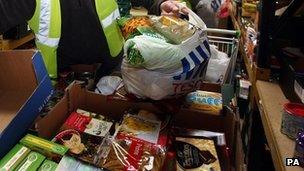'Huge' increase in demand at London food banks
- Published

40,000 Londoners used food banks from 2012-2013
The number of people using food banks in London has tripled in the last year, according to new figures.
The UK's main provider of food banks, the Trussell Trust, , externalsaid the number of people relying on food banks in the capital rose to 42,064 in 2012-13.
People in Southwark relied the most on food banks, followed by Redbridge and Bromley, the charity said.
Rosie Boycott, the Mayor's food advisor, said food poverty was an "unacceptable problem".
The charity said the rising cost of living and unemployment could be behind the increase.
Emergency food
At least 42,064 people visited food banks in London in 2012-13 compared to 14,569 people the previous year.
Across the UK, the Trussell Trust food banks gave three-day emergency supplies to 346,992 people in the last 12 months.
The trust said in London it provided for 988 people in Southwark - the highest demand in the capital, followed by Redbridge with 553 and Bromley with 531.
Hammersmith had 488 users while Kingston saw 465 people come to food banks.
Ms Boycott said: "There are a huge range of contributory factors and tackling it properly requires collaboration between government, London's boroughs and the private and voluntary sectors."
She said the advisory group, the London Food board, was taking steps to address the problem.
The Reverend Ben Goodyear, who runs a food bank at St Paul's Church in Brixton, said the increase in demand had been "huge".
He said: "It can be anyone and it is often the people you don't imagine.
"We had one mum who was training to be a teaching assistant and was trying to get a job but couldn't find one.
"She got a massive bill through, paid it and didn't have enough money for food."
Mr Goodyear said the Brixton branch had seen a sharp increase in users since it opened.
"In our first six months we fed around 1,000 people and now we're feeding 800 a month.
"We never turn people away but there are times when we run out of some food stuff, like tinned tomatoes or coffee."
- Published30 May 2013
- Published27 March 2013
- Published24 April 2013
- Published16 October 2012